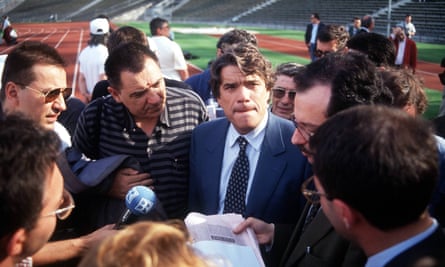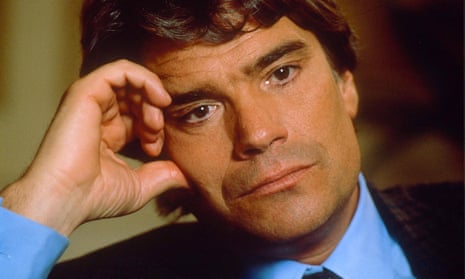As a businessman and would-be actor, Bernard Tapie played many roles during a rollercoaster career that embraced success and scandal in almost equal measure. The flamboyant Frenchman, who has died aged 78 of cancer, was a shrewd entrepreneur, a star of screen and stage, politician, government minister, president of Olympique de Marseille football club, television presenter, owner of a successful cycling club and a press baron.
Champion to some, charlatan to others, he displayed talents that were many and varied, but not always within the law, even if he always denied any wrongdoing. The elephant in the eulogies following his death was his recurring relationship with French justice, notably convictions for football match-fixing and tax fraud that resulted in him spending several months in jail.
In his tribute to Tapie, the French president, Emmanuel Macron, highlighted these contradictions by observing that he was “boastful, charismatic, seductive” and that “the golden legend was intertwined with the shadows of his legal sagas – lost trials, heavy sentences – decisions that he contested all his life”. Still, Macron added, Tapie’s “ambition, energy and enthusiasm were a source of inspiration for generations of French people”.
Tapie had hauled himself out of a poor background to make a fortune buying up and recovering bankrupt companies, and flaunted his wealth with what some saw as Trump-like flair. But he also gave large sums to charity – often discreetly – and dreamed up projects to help young unemployed people.
His political affiliations were equally ambiguous: first elected as an MP on an independent ticket in 1989, he served two stints as urban affairs minister in President François Mitterrand’s socialist cabinet of the early 1990s, and was elected for a second time in 1993 as a member of the leftwing Mouvement des Radicaux de Gauche, of which he was head. He became an MEP in 1994 for the same party, but was obliged to give up politics because of his legal problems, and later gave his support to the centre-right president Nicolas Sarkozy.
Each time he was knocked down, Tapie got up again. His motivation, like his personal motto, was “winning”. He took the blows and rolled with the criticism and as a result, for four decades, his name was never far from the headlines.
His death came just days before a French court was due to rule on a complex legal battle that poisoned the last decades of Tapie’s life. The “Adidas controversy”, which he would call the biggest of all the “stupid mistakes” in his career, dragged on for almost 30 years after Tapie sold his majority stake in the then ailing Adidas sports company to a group of private investors to avoid any conflict of interests when he was a government minister in 1993.

A year later, Adidas was sold again for more than double the price. Tapie sued the part state-owned Crédit Lyonnais bank, claiming it had deliberately undervalued the firm. In 2008 an arbitration panel awarded Tapie €403m in damages and interest, to be paid from public funds, causing a national outcry.
In 2015 an appeal court overruled the award and ordered Tapie to pay back the money with interest. But the businessman, famed for his tan and his bouffant hair, said the money had all gone, declaring: “I am ruined. Ruined.” Since then, the case has bounced back and forth with judgments and appeals.
Tapie was born and grew up in a working-class suburb of Paris, the elder of two sons of Jean-Baptiste Tapie, a refrigeration engineer, and his wife, Raymonde (nee Nodot), a nurse. The family of four lived in a tiny flat with no bathroom and a lavatory at the end of the courtyard, but young Bernard was content. “I don’t know of any children who were happier than I was,” he said.
Once he had left school, Tapie started selling televisions by day while singing in Paris clubs by night. At one point he dreamed of becoming a pop singer (releasing a single that flopped), then a Formula 3 racing driver. But he gave up those early enthusiasms to devote himself to business.
By the time he was 30 he had made a fortune by recovering bankrupted companies. Later his cycling team, La Vie Claire, which he set up with the cycling champion Bernard Hinault, won the Tour de France twice – in 1985 and 1986 – and he owned Olympique de Marseille between 1986 and 1994, while also holding a major stake in the Marseille daily newspaper La Provence.
In Marseille he will always be a local hero. Olympique de Marseille football club was in debt and languishing in 17th place in the French championship when he took over in 1986. Six years later, with the help of star players acquired at great expense, the team won the Champions League – a feat no other French club has achieved to this day.
In 1995, however, it was revealed that Tapie had offered a bribe to a rival French team, Valenciennes, to underperform against Marseille in a league game during the run up to that 1993 Champions league final, so that his players could stay fresh for the big match. Tapie was sentenced to eight months in jail after being found guilty of corruption, and Marseille were stripped of their French league title, though not their Champions League honours.
On his release, banned from football and politics, Tapie took to acting, playing several roles, including that of Benoit Blanc in Claude Lelouch’s 1996 movie Hommes, Femmes, Mode d’emploi (Men, Women: A User’s Manual) and a police inspector in a dozen 90-minute episodes of the popular television series Commissaire Valence (2003-08). In 1998 he collaborated with the French rapper Doc Gynéco on the song C’est Beau la Vie (Life Is Beautiful), and two years later made his debut in the theatre, receiving rave reviews for his portrayal of Jack Nicholson’s role of Randle McMurphy in One Flew Over the Cuckoo’s Nest.
As well as serving time for his match-fixing conviction, Tapie was twice convicted of tax fraud, first in 1997 when he was sentenced to 18 months, of which 12 months were suspended, and again in 2005, when he was sentenced to three years in prison, 28 months of which were suspended. In the latter case, he was accused of charging personal expenses, including staff at his Paris home and a yacht, to his company account. However, he did not return to jail as the court decided his sentences could be set against the eight months he had already spent in prison.

Despite his transgressions, in 2017, the year his stomach cancer was diagnosed, Tapie told Le Monde he was largely satisfied with his life. “When you’ve won the Tour de France, the Champions League, you’ve been minister, singer, actor … what have I not done?” he said. “I can’t say I haven’t been spoiled rotten by life.”
Hinault, who became close to Tapie, said of his friend: “He wanted to touch everything. Perhaps he made a mistake in going into politics, but it was his choice. There are those who win and those who lose. He was in the first category.”
In 1964 Tapie married Michèle Layec, and they had two children, Nathalie and Stéphane. The marriage ended in divorce, and in 1987 he married Dominique Mialet-Damianos, with whom he also had two children, Laurent and Sophie. Dominique survives him, along with his four children, nine grandchildren and a great-grandson.
Bernard Roger Tapie, businessman and politician, born 26 January 1943; died 3 October 2021
